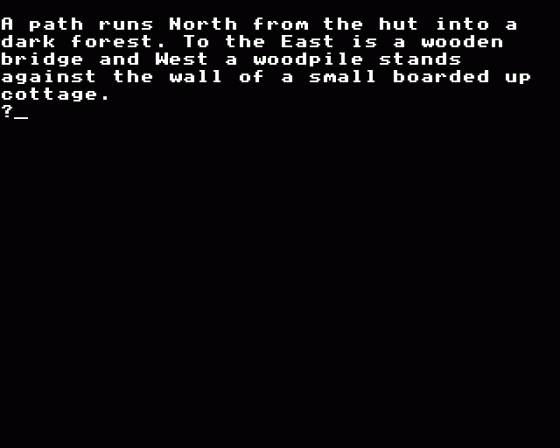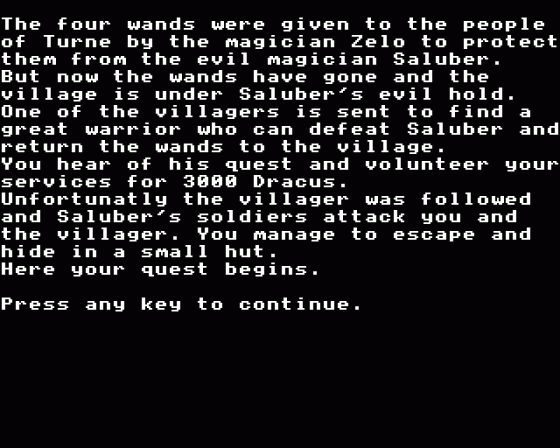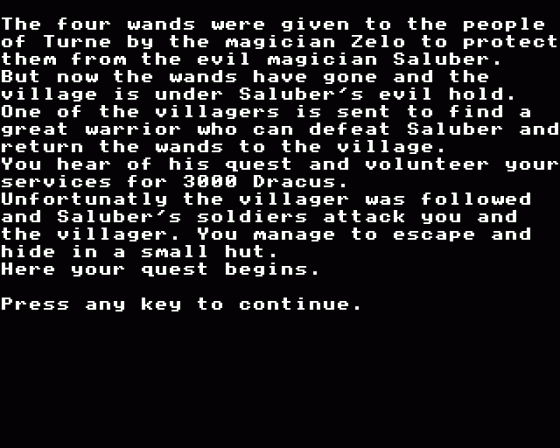
EUG PD
 1st July 2003
1st July 2003
Categories: Review: Software
Author: Dave E
Publisher: D. W. Gore
Machine: Acorn Electron
Published in EUG #63
Just about at the turn of the millennium, one of the regular mass injections to the Stairway To Hell website unearthed a great deal of text adventures. To collectors, this was an archive dreams were made of. Not only were there recognisable titles, to use the old cliche, thought "lost forever" but also a great deal of others. Some of the runner-up entries to Electron User's adventure writing competition, for example, and some of the later titles by Potter were all now freely playable with a few clicks of the mouse.
For a while, the ubiquitous Dave M (webmaster of StH) found himself in a bit of a quandary as to where a lot of them should be filed. Many of them were written with Gilsoft's The Quill utility and only limited to a small 'print run'. Some were even written in BASIC. Many seemed to be of mysterious origin, either without software house introductory screens or from a hitherto unknown company. All were also actually submitted to StH as .uef files [Images of the original tape recordings, jargon busters - Ed] with messages stating they worked in Mode 4 or 6 hence on both BBC and Electron machines. But whether this had been the case when/if they were actually on sale we have yet to discover.
The Four Wands is but one of these antiquities, a wholly fictitious NSEW affair in a mythical land where you play a brave warrior. Perhaps to typify the strange things you are in for when you try out one of these beauties, the rather unflattering black and white screen of text that greets you before the first part of this Quilled adventure loads in states "Copyright D. W. Gore 1988" but nothing else.

It has much of the charm of an EU competition reject, although I have cross-indexed it against those entries Pendragon thought worthy of mentioning at the time and it is absent from them. The idea, as you may have gathered, is hardly bubbling with originality. However, much of the appeal of a good text adventure stems from the atmosphere the narratives generate. As Larsoft proved, you can get away with some of the weirdest scenarios imaginable as long as the programming is devious, the puzzles fathomable and the storytelling slick.
Alas, and I can only speak of part one of Four Wands (as I can't get any further), your attempt to thwart the plans of the evil magician Saluber has rather less to coax you into repeated efforts than comparable titles like Salandra. Firstly, the location descriptions are not particularly well written, frequently telling you what you can see before telling you where you are, and Gore has put no 'polish' on the finished product.
You start off in a hut, and wander around the paths and bridges surrounding this location finding little of interest beside a boulder, a gate, a lady living in a cottage and a cellar in your domicile. If you attempt to EXAMINE any objects you find, you get the message that you see nothing of interest (which co-incidentally you also get if you type EXAMINE followed by any word) when you might expect at least a cursory inspection to take place. Perhaps I'm being finicky but I also found that, at the cottage, the command KNOCK outside the door brought no response but that KNOCK DOOR did. As someone who has programmed with The Quill, this kind of parser limitation is very easily avoided and Gore should have ensured he followed the user guide's advice in doing so.

Something which is also annoying is that some messages only appear on screen for a very short period of time before the screen is blanked and the location description re-described. Outside the village shop I was informed of a sign which I thought I might try READing. It brought no response so I EXAMined it instead. At which point I saw what it in fact read flash up on the screen but it disappeared before I'd got to the end of its information.
Regrettably, these problems with the parser and the lack of long enough pauses are in addition to some painful spelling mistakes. "I can't move the boulder. It's to heavy!" is one; "I'm by a stagnent pool" another.
From what I've seen of the puzzles, however, these do go some way to balancing the adventure out. The lady at the cottage requires some wood for her fire and a large plank barricading the back entrance to your hut seems to provide the answer. Trekking all the way back there to get it, you find that it is securely nailed in place so it is no longer an option. After musing a while longer, you discover a pile of wood close by and pull a log out of it. But this isn't the answer either - the lady simply says it's too big for her fire. This style of puzzle is very much that employed by the grandmasters of adventure gaming (the likes of Peter Killworth) and leads me to wonder if Gore was adopting a little of their technique when composing Four Wands. Although once again he lets the adventure down by using punctuation incorrectly throughout this sequence, it is an admirable attempt to devise a devious solution to what seems like an easy problem.
There are a few further odd touches too though. In a cave you will, if you EXAMine it, discover a boat in a pool. The logical next step, you might think, would be to get into it. However, intriguingly, you cannot. But you can pick up the boat and carry it around with you if you wish. This creates rather a strange mental picture of the great hero you are playing - walking around the Turne's local pub with a boat in one hand and an oar in the other!
To conclude it's only fair to say that there's evidently a lot more to this adventure than the opening thirty or so locations this review is based on. These may be upset by the odd programming fluff, yes, but the old grey matter is still put through its paces by Four Wands. Like many of these re-discovered "Are they really legitimate professional Electron titles?", its real problem is that it suffers from having a very 'pre-release' feel to it.
This is not to describe this adventure as amateur though. It's not a bad game at all and clearly a lot of work has gone into its creation. It simply plays as though its full potential was never realised because the finishing touches to it were never implemented.











